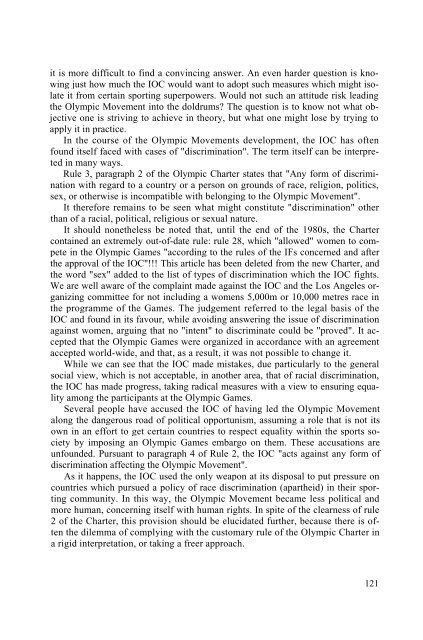Create successful ePaper yourself
Turn your PDF publications into a flip-book with our unique Google optimized e-Paper software.
it is more difficult to find a convincing answer. An even harder question is knowing<br />
just how much the IOC would want to adopt such measures which might isolate<br />
it from certain sporting superpowers. Would not such an attitude risk leading<br />
the Olympic Movement into the doldrums? The question is to know not what objective<br />
one is striving to achieve in theory, but what one might lose by trying to<br />
apply it in practice.<br />
In the course of the Olympic Movements development, the IOC has often<br />
found itself faced with cases of "discrimination". The term itself can be interpreted<br />
in many ways.<br />
Rule 3, paragraph 2 of the Olympic Charter states that "Any form of discrimination<br />
with regard to a country or a person on grounds of race, religion, politics,<br />
sex, or otherwise is incompatible with belonging to the Olympic Movement".<br />
It therefore remains to be seen what might constitute "discrimination" other<br />
than of a racial, political, religious or sexual nature.<br />
It should nonetheless be noted that, until the end of the 1980s, the Charter<br />
contained an extremely out-of-date rule: rule 28, which "allowed" women to compete<br />
in the Olympic Games "according to the rules of the IFs concerned and after<br />
the approval of the IOC"!!! This article has been deleted from the new Charter, and<br />
the word "sex" added to the list of types of discrimination which the IOC fights.<br />
We are well aware of the complaint made against the IOC and the Los Angeles organizing<br />
committee for not including a womens 5,000m or 10,000 metres race in<br />
the programme of the Games. The judgement referred to the legal basis of the<br />
IOC and found in its favour, while avoiding answering the issue of discrimination<br />
against women, arguing that no "intent" to discriminate could be "proved". It accepted<br />
that the Olympic Games were organized in accordance with an agreement<br />
accepted world-wide, and that, as a result, it was not possible to change it.<br />
While we can see that the IOC made mistakes, due particularly to the general<br />
social view, which is not acceptable, in another area, that of racial discrimination,<br />
the IOC has made progress, taking radical measures with a view to ensuring equality<br />
among the participants at the Olympic Games.<br />
Several people have accused the IOC of having led the Olympic Movement<br />
along the dangerous road of political opportunism, assuming a role that is not its<br />
own in an effort to get certain countries to respect equality within the sports society<br />
by imposing an Olympic Games embargo on them. These accusations are<br />
unfounded. Pursuant to paragraph 4 of Rule 2, the IOC "acts against any form of<br />
discrimination affecting the Olympic Movement".<br />
As it happens, the IOC used the only weapon at its disposal to put pressure on<br />
countries which pursued a policy of race discrimination (apartheid) in their sporting<br />
community. In this way, the Olympic Movement became less political and<br />
more human, concerning itself with human rights. In spite of the clearness of rule<br />
2 of the Charter, this provision should be elucidated further, because there is often<br />
the dilemma of complying with the customary rule of the Olympic Charter in<br />
a rigid interpretation, or taking a freer approach.<br />
121

















